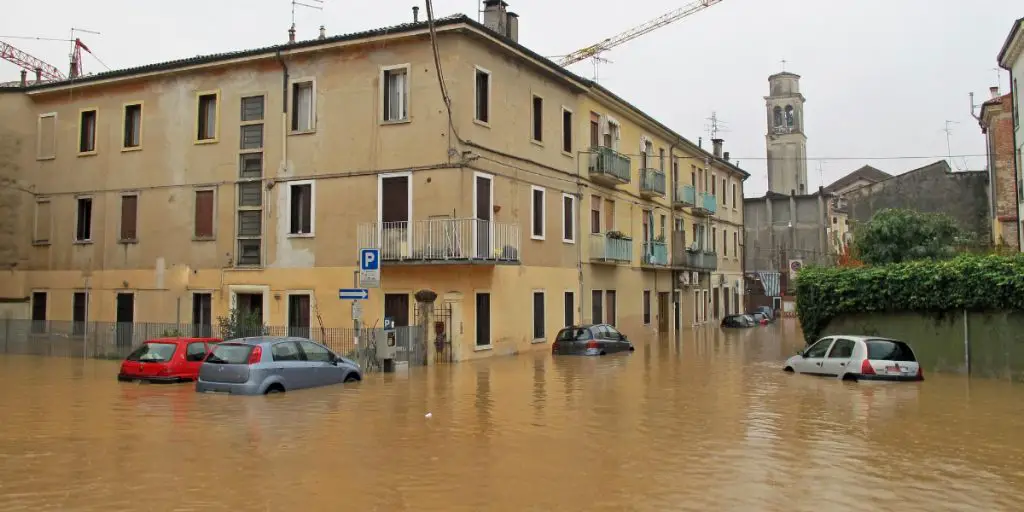In recent years the news has featured an increasing number of stories about areas being flooded, causing damage to both residential and commercial properties. Given the damage a flood can cause, should you buy a flood-risk property?
You should buy a flood-risk property if you’re satisfied the seller has taken adequate precautions against any potential flood risk. You should also be satisfied there are measures in place in the local area to prevent and deal with any possible flooding incident.
Last November saw 53 Environment Agency flood warnings plus another 89 flood alerts covering large parts of the UK, notably across Yorkshire and Derbyshire, causing mayhem and misery to thousands of homes and businesses in one of the wettest ever autumns.
It was the latest of many flooding disasters affecting Britain over the last years. According to the surveyors’ professional body, the Royal Institution of Chartered Surveyors (RICS), climate change is increasing the risk of flooding for homes.
Flooding won’t be the first thing on your mind when you’re buying a property, but perhaps it should be taken more seriously?
Although most houses are not at risk of flooding, one in six homes in England are, even in areas that are not immediately waterside. Did you know that you’re more likely to get flooded than burgled?
What causes flooding in our homes?
The most common reason for flooding is rivers bursting their banks after periods of heavy rain. In seaside areas, unusual high tides are an obvious risk.
In areas that are nowhere near the sea or a river, surface water flooding can cause flash floods that follow downpours and thunderstorms.
Then there’s groundwater flooding caused by a rise in the water table leading to water seeping into basements and cellars.
Many low-lying areas have been identified as floodplains – flat expanses of usually agricultural land near waterways that are often flooded when the river or stream becomes too full.
Building on floodplains is a common, though controversial, practice that is broadly discouraged. However, given the obvious commercial potential of the attractive setting, mounting pressures to meet the government’s ambitious housing targets and a dearth of suitable development land available, thousands of new homes are still being built in vulnerable areas.
Despite warnings from scientists about climate change, the proportion of new homes built in high flood risk areas has risen significantly, up from 7% in 2013/14 to 11% in 2016/17.

How do you know if a house is at risk of flooding?
If you are thinking of buying a property, the onus is on you to find out whether the building is at risk of flooding.
If it is situated near water, always factor the flood risk into any checks you carry out.
If it is on a floodplain, it is not currently mandatory for a survey to show the risk, though all RICS HomeBuyer Reports and Building Surveys will contain a short section commenting on the typography of the surrounding area.
If you have any concerns at all, you should raise this with the surveyor prior to the inspection so he can endeavour to pay extra attention to this during the survey.
You can also check if the property is in danger of regular flooding through this government website: https://www.gov.uk/check-flooding
Once your offer is accepted, your solicitor will complete a number of essential property searches as part of the home buying process. This includes a Flood Risk search for properties near water, with the results revealing how high the risk of flooding is in the area.
What are the implications for your home insurance?
If the property is located in a high-risk flood zone area or has been flooded before, getting the right home insurance is key.
Shop around for policies, armed with as much information as possible, to get the most reasonable deal, bearing in mind that premiums are going to be high.
Some insurance companies may ask for an Insurance Related Request letter that you can get from the Environment Agency to confirm the flood risk level of the property. Mortgage lenders will also be interested in this letter to satisfy themselves that the building is insurable.
Also check with Flood Re, a government-backed, not-for-profit insurance scheme established by the Association of British Insurers, designed to make it easier for people at risk of flooding to get affordable home insurance cover. The scheme offers a backstop for properties that have had more than one episode of flooding and would otherwise be uninsurable.
How to flood proof a vulnerable property
There are a few things that you can do to protect a property at risk from flooding – and as a prospective buyer you (and your mortgage lender) will certainly want to be reassured that at least some of these are in place.
Local flood defences for doors and windows are a good starting point. Stone or tiled flooring instead of carpets are a sensible choice for downstairs areas prone to flooding, as is the installation of power points higher up on the walls rather than at floor level.
Fitting non-return valves on drains can be a valuable defence against flash floods.
Finally, it’s a good idea to floodproof any valuables in the house, storing priceless possessions on upper floors or in the loft, not the basement.
What to ask the seller
While the legal principle of caveat emptor (buyer beware) continues to apply to property transactions, it’s important for you to feel that the seller is being upfront with you about the condition of the property in general, and its history of flooding in particular.
Make sure you ask about any flooding episodes in the past, including supporting documentation such as evidence of the nature of any flood damage and the cost of repairing it, and the knock-on impact on home insurance premiums.
At the end of the day, if you’ve found the house of your dreams and the seller has convinced you that adequate flood precautions have been taken, chances are that you will take the risk and proceed with the purchase. While millions of Britons live in flood risk areas, as long as the risks are properly managed there’s no reason why you shouldn’t feel safe and secure in your new home.
Sources
https://www.ft.com/content/5480cd42-1a74-11ea-97df-cc63de1d73f4
https://www.homewardlegal.co.uk/guides-advice/post/what-conveyancing-search-flood-risk-report


